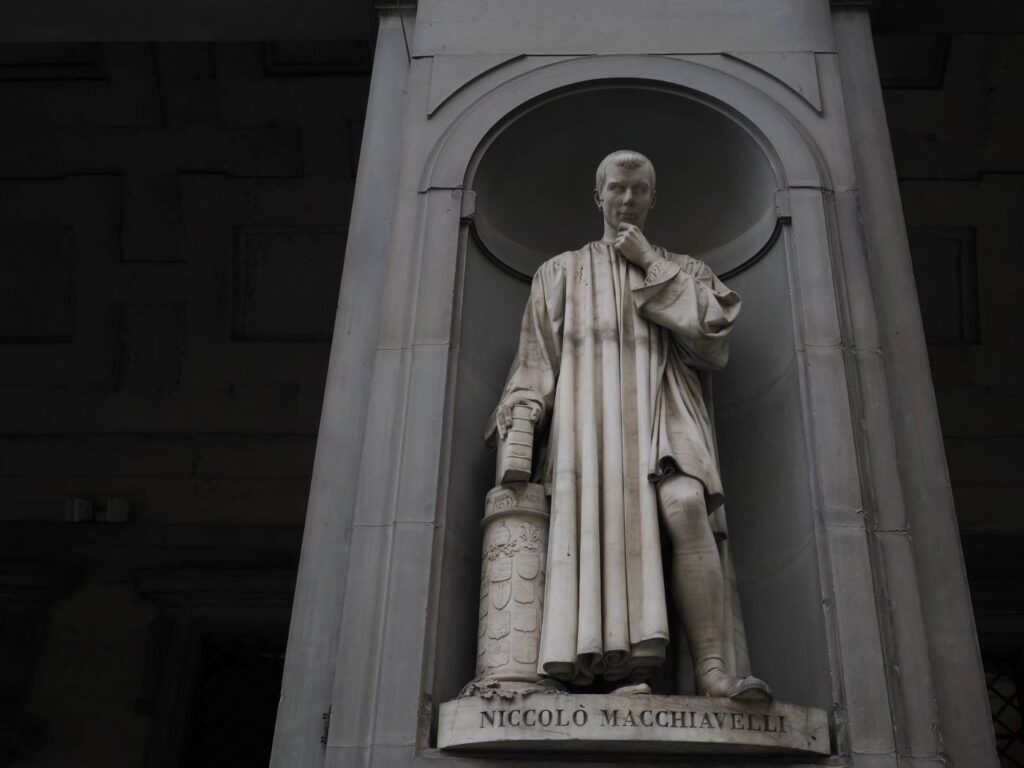At the close of last year’s spring semester, Harvey C. Mansfield retired from Harvard University, where he had been teaching politics for nearly sixty years. While at Harvard, Mansfield was a towering and legendary figure. Known as “C- Mansfield” for his policy of having an “official” (but fake) grade that a student was given and a “secret” grade that the student allegedly deserved, Mansfield had the rare quality of being a political conservative at an Ivy League school. The author of the 2006 book Manliness, a work that helped to ignite the “men’s movement,” Mansfield was also known as a puckish public intellectual, who clashed with feminists and multiculturalists seeking to abolish the Western canon on American campuses. In his new book, a collection of essays titled Machiavelli’s Effectual Truth: Creating the Modern World, Mansfield reveals his tremendous knowledge as a close and intelligent reader of early modern and Enlightenment political philosophy.
Politics and Virtue in a Material World
Niccolò Machiavelli’s readers are a dime a dozen on the internet, and phrases—either from Machiavelli himself or inspired by the Italian Renaissance thinker—can be found throughout postmillennial global culture. Perhaps the most famous contemporary popularizer of Machiavelli is author Robert Greene, the author of the Machiavelli-inspired 48 Laws of Power (1998). In Machiavelli’s Effectual Truth, however, Harvey Mansfield undertakes a detailed and thorough (and even “esoteric”) reading of Machiavelli’s works. Mansfield notes that the book, a companion to his 1997 Machiavelli’s Virtue, is fundamentally an exploration of the concept of “effectual truth” (verità effetuale), the “takeaway” (Mansfield’s term) that modern and Enlightenment thinkers have gotten from Machiavelli’s work. In Mansfield’s reading, Machiavelli viewed himself as “uno solo” or the “one alone” who embodied his new idea of virtue and who would later become the “prince” of modernity by shaping the modern and eventually “post-Christian” understanding of politics and virtue (as well as, by implication, of metaphysics).
Machiavelli envisions his philosophy creating a philosophical movement led by “captains” who will develop Machiavelli’s secular vision. In contrast to Plato and Christianity, which show the present material world as incomplete and imperfect in contrast to a higher and better world, Machiavelli, in Mansfield’s reading, believes there is only this material world. This material world has its own rules, but these rules can be mastered by a talented man of action and intelligence. Professor Mansfield thus links Niccolò Machiavelli with Sir Francis Bacon as one of the founders of what would develop as secular modernity.
Start your day with Public Discourse
Sign up and get our daily essays sent straight to your inbox.Moreover, Mansfield’s Machiavelli’s primary goal is to subvert and overturn Christianity. It is important to note, as Professor Mansfield does himself, that this reading of a secular, indeed anti-Christian, Machiavelli is not the only reading of the Italian philosopher. Some thinkers attempt to show that Machiavelli was a Christian who simply was trying to teach his readers who think and work in a “fallen world.” Nonetheless, regardless of whether one agrees with Mansfield’s ultimate reading, there is little question that Mansfield has developed a mastery of not only Machiavelli’s life and work but of the development of modern thought.
Regardless of whether one agrees with Mansfield’s ultimate reading, there is little question that Mansfield has developed a mastery of not only Machiavelli’s life and work but of the development of modern thought.
The Hard Facts of Reality
Mansfield’s Machiavelli is thus the father of modern realism in both science and politics, which ruled the West until the idealism of thinkers like Rousseau and Kant. Machiavelli emphasizes the effect of an action as opposed to one’s intent (or imagined intent). This effect, according to Mansfield, can be called “fact.” Mansfield further contrasts effectual truth with the truth of nature, found in thinkers as early as Thales but first made famous by Socrates and Plato, and then later Aristotle and his followers. Indeed, Mansfield sees Machiavelli as being for modern thought what Aristotle was for late classical and medieval thought.
Necessity plays a major role in Machiavelli’s work, being both “descriptive and normative.” Thus, facts and values are the same. Mansfield further notes that Machiavelli does not use the word “soul” in his major works. Morality then becomes wishful thinking and part of imaginative truth. The hard facts of reality, in this view, do not necessarily always adhere to the moral rules of Christianity, Platonism, or similar systems. All of reality is contingent and mutable, and each situation has its own “rules” and fruitful pragmatic response.
Machiavelli’s Successors
Mansfield’s description of Machiavelli’s attack on Christianity is convincing as a scholarly analysis of Machiavelli’s text. However, much of his description of Machiavelli’s thought appears to parallel certain elements of Mansfield’s own, which, though conservative, is not necessarily Christian. Indeed, religious readers could object that Christianity is unique precisely because of its emphasis on the material world as the site of Christ’s incarnation and our encounter with God through the materiality of the sacraments. Nonetheless, Mansfield’s seemingly sympathetic depictions of Machiavelli’s condemnation of Christian hypocrisy and corrupt clergy are points with which even the most religious reader can sympathize. Certainly, evil men can wield religion as a tool by which to seek power and manipulate others in cowardly and very “unmanly” ways.
There are three other major thinkers considered in Machiavelli’s Effectual Truth: Leo Strauss, Montesquieu, and Tocqueville. Mansfield reads these thinkers as being, in their own ways, successors of Machiavelli. Strauss famously condemned Machiavelli as a “noble perversity” and “fallen angel,” but, according to Mansfield, he nonetheless sought to promote Machiavelli’s work in his 1958 book Thoughts on Machiavelli. In it, Strauss undertakes a curious esoteric reading of Machiavelli, thus radically changing how scholars read the Renaissance Italian figure.
In Strauss’s reading, Machiavelli provides a numeric code to deciphering his hidden thought (something Strauss himself does in Thoughts on Machiavelli). Machiavelli’s hidden teaching is to present himself as a teacher of evil who will use the Church’s teaching for his own benefit. Likewise, in his The Spirit of the Laws (1748), Montesquieu rejects Machiavelli as being too harsh, while at the same time being deeply influenced by him. Montesquieu is thus a kinder and gentler eighteenth-century Machiavelli who wished to “relieve and reassure” the people of his intended commonwealth. Finally, despite the seeming disconnect between the work of Niccolò Machiavelli and that of Alexis de Tocqueville, Mansfield, in a final chapter begun by his late wife Delba Winthrop, makes the argument that Tocqueville was, like Strauss, a reader of the “esoteric” Machiavelli. Mansfield further holds that Machiavelli was, in fact, “the true founder of modern democracy.” Just as Machiavelli misreads Christianity to subvert it, so too does Tocqueville misread Machiavelli to show how democracy can be tamed.
The Dubious Future of Higher Education
Harvey Mansfield’s Machiavelli’s Effectual Truth is ultimately an interesting work from an esteemed scholar, but there are warning signs that, as Mansfield’s generation retires, higher education will not be left in good hands. In a 2022 First Things article titled “The Honor Deficit,” Harvard historian James Hankins makes a curious comment about the current state of higher education. While teachers have complained about their students since the inception of academia (St. Augustine famously moved from North Africa to Rome to Milan to escape his badly behaved students), what is interesting is the swipe that Hankins takes at his fellow Ivy League professors. Specifically, he warns that the decline of academic standards will lead to the decline of academia. Earlier generations of conservative academics had clashed with (often brilliant) Marxists or “Old Liberals” as well as the later baby boomer denizens of the New Left. However, contemporary conservatives have to struggle against the problem not of students indoctrinated in the errors of dialectical materialism or hippy radicalism, but rather, those students and faculty who want the university experience to be what some have called “adult daycare.”
Such a decline makes the retirement of Harvey Mansfield, a figure known for his teaching and scholarly rigor, that much more noteworthy. Readers do not have to agree with Mansfield’s reading of Machiavelli or with his secular conservative worldview. Machiavelli’s Effectual Truth nonetheless demonstrates the powers of an academic who spent his life fighting for a liberal and humane education for America’s best and brightest.
Image by Andrea Izzotti and licensed via Adobe Stock. Image resized.













